-
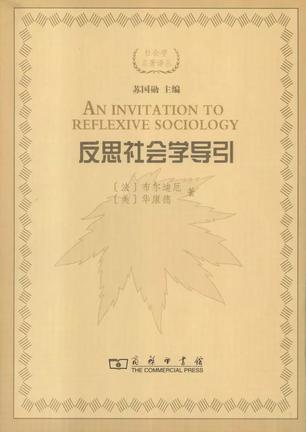
反思社会学导引
本书由三个部分组成,第一部分是诠释性的,它通过勾勒出布迪厄有关知识、实践和社会的理论结构及其学术图景的轮廓,向人们展示了布迪厄著作的广博体系和内在理路;第二部分是分析性的,主要是在芝加哥大学研讨班所展开的精心构思的对话内容,在这一部分,布迪厄澄清了他的理论研究实践和经验研究实践的全部重要之处,并对这两方面的实践进行了反思;第三部分以巴黎研讨班的讨论为基础,为1988年春天布迪厄在法国社会科学高等研究中心为他的研究生讨论课所做的导论性质的发言。在这些讨论课上,布迪厄没有灌输某一组概念,而是强调一种产生社会学创造力的一般性倾向,他倡导并采纳了一种总体性的自我指涉教学法。 -

单身者舞会
本书是布迪厄生前编写的最后一部民族社会学著作,2002年3月,在其逝世后一个月,本书于巴黎正式出版。全书由布迪厄的三篇论文构成,围绕法国农村中愈加普遍的长子单身现象,分别写作于其学术生涯的不同时期。布迪厄指出,这三篇文章的汇集,清晰地反映了其社会学理论发展的逻辑轨迹。从对贝亚恩农村社会的田野考察,到与结构主义方法的决裂,以及对于在一个统一的婚姻市场中的象征资本和习性的分析,本书给予了我们一种社会学和人类学的视角和洞察力,来看待职业、社会阶层和婚姻之间的互动,以及它们对于一个小型社会的影响。舞会散场,单身者三三两两,逐渐离去。最终,布迪厄用一种小说家的眼光和敏锐,向我们描述了20世纪法国传统农业社会的危机和崩溃。 -
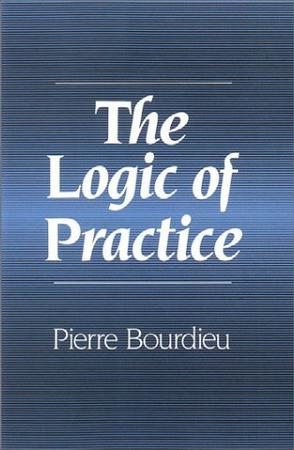
The Logic of Practice
Our usual representations of the opposition between the "civilized" and the "primitive" derive from willfully ignoring the relationship of distance our social science sets up between the observer and the observed. In fact, the author argues, the relationship between the anthropologist and his object of study is a particular instance of the relationship between knowing and doing, interpreting and using, symbolic mastery and practical mastery--or between logical logic, armed with all the accumulated instruments of objectification, and the universally pre-logical logic of practice. In this, his fullest statement of a theory of practice, Bourdieu both sets out what might be involved in incorporating one's own standpoint into an investigation and develops his understanding of the powers inherent in the second member of many oppositional pairs--that is, he explicates how the practical concerns of daily life condition the transmission and functioning of social or cultural forms. The first part of the book, "Critique of Theoretical Reason," covers more general questions, such as the objectivization of the generic relationship between social scientific observers and their objects of study, the need to overcome the gulf between subjectivism and objectivism, the interplay between structure and practice (a phenomenon Bourdieu describes via his concept of the "habitus), the place of the body, the manipulation of time, varieties of symbolic capital, and modes of domination. The second part of the book, "Practical Logics," develops detailed case studies based on Bourdieu's ethnographic fieldwork in Algeria. These examples touch on kinship patterns, the social construction of domestic space, social categories of perception and classification, and ritualized actions and exchanges. This book develops in full detail the theoretical positions sketched in Bourdieu's "Outline of a Theory of Practice. It will be especially useful to readers seeking to grasp the subtle concepts central to Bourdieu's theory, to theorists interested in his points of departure from structuralism (especially fom Levi-Strauss), and to critics eager to understand what role his theory gives to human agency. It also reveals Bourdieu to be an anthropological theorist of considerable originality and power. -
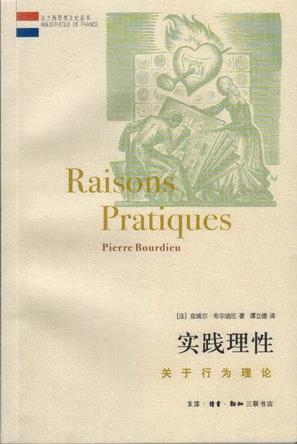
实践理性:关于行为理论
本书是布尔迪厄对自己数年来探讨的。行为理论”的一个总结。通过对空间,时间.实践、卡比利亚的礼仪和亲属关系,文学作品、国家精神、艺术感知范畴.学校制度等诸方面多维度的深化探索,对诸如“场域”、“习性”、“资本”、“象征”等概念、进行全面而深入的阐释。 作者致力于谁就法国特殊情况而构建的模式的普遍性。这些模式建立在关系的哲学和性情倾向的行为哲学上。 -
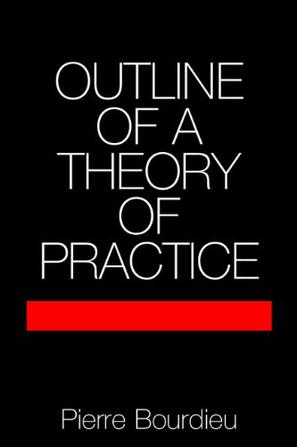
Outline of a Theory of Practice
Outline of a Theory of Practice is recognized as a major theoretical text on the foundations of anthropology and sociology. Pierre Bourdieu, a distinguished French anthropologist, develops a theory of practice which is simultaneously a critique of the methods and postures of social science and a general account of how human action should be understood. With his central concept of the habitus, the principle which negotiates between objective structures and practices, Bourdieu is able to transcend the dichotomies which have shaped theoretical thinking about the social world. The author draws on his fieldwork in Kabylia (Algeria) to illustrate his theoretical propositions. With detailed study of matrimonial strategies and the role of rite and myth, he analyses the dialectical process of the 'incorporation of structures' and the objectification of habitus, whereby social formations tend to reproduce themselves. A rigorous consistent materialist approach lays the foundations for a theory of symbolic capital and, through analysis of the different modes of domination, a theory of symbolic power. -
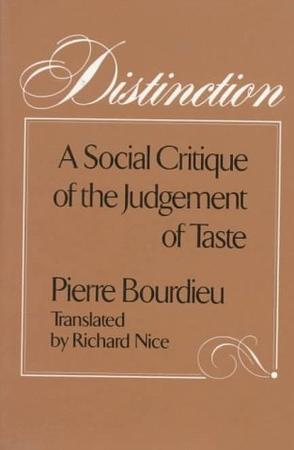
Distinction
No judgement of taste is innocent. In a word, we are all snobs. Pierre Bourdieu brilliantly illuminates this situation of the middle class in the modern world. France's leading sociologist focusses here on the French bourgeoisie, its tastes and preferences. Distinction is at once a vast ethnography of contemporary France and a dissection of the bourgeois mind. In the course of everyday life people constantly choose between what they find aesthetically pleasing and what they consider tacky, merely trendy, or ugly. Bourdicu bases his study on surveys that took into account the multitude of social factors that play a part in a Frenchperson's choice of clothing, furniture, leisure activities, dinner menus for guests, and many other matters of taste. What emerges from his analysis is that social snobbery is everywhere in the bourgeois world. The different aesthetic choices people make are all distinctions-that is, choices made in opposition to those made by other classes. Taste is not pure. Bourdieu finds a world of social meaning in the decision to order bouillabaisse, in our contemporary cult of thinness, in the "California sports" such as jogging and cross-country skiing. The social world, he argues, functions simultaneously as a system of power relations and as a symbolic system in which minute distinctions of taste become the basis for social judgement. The topic of Bourdieu's book is a fascinating one: the strategies of social pretension are always curiously engaging. But the book is more than fascinating. It is a major contribution to current debates on the theory of culture and a challenge to the major theoretical schools in contemporary sociology.